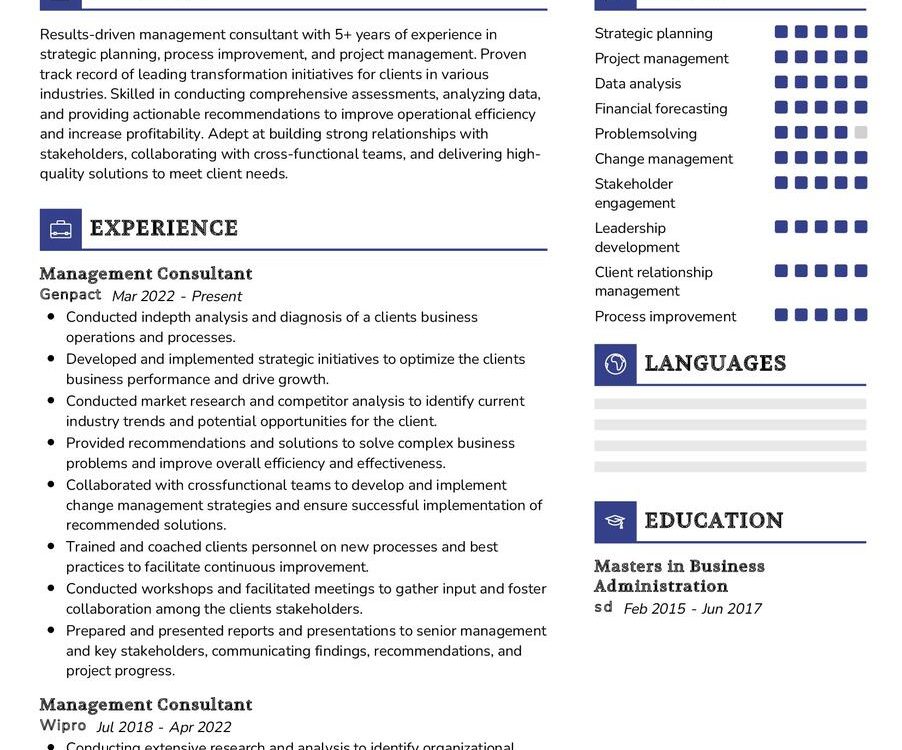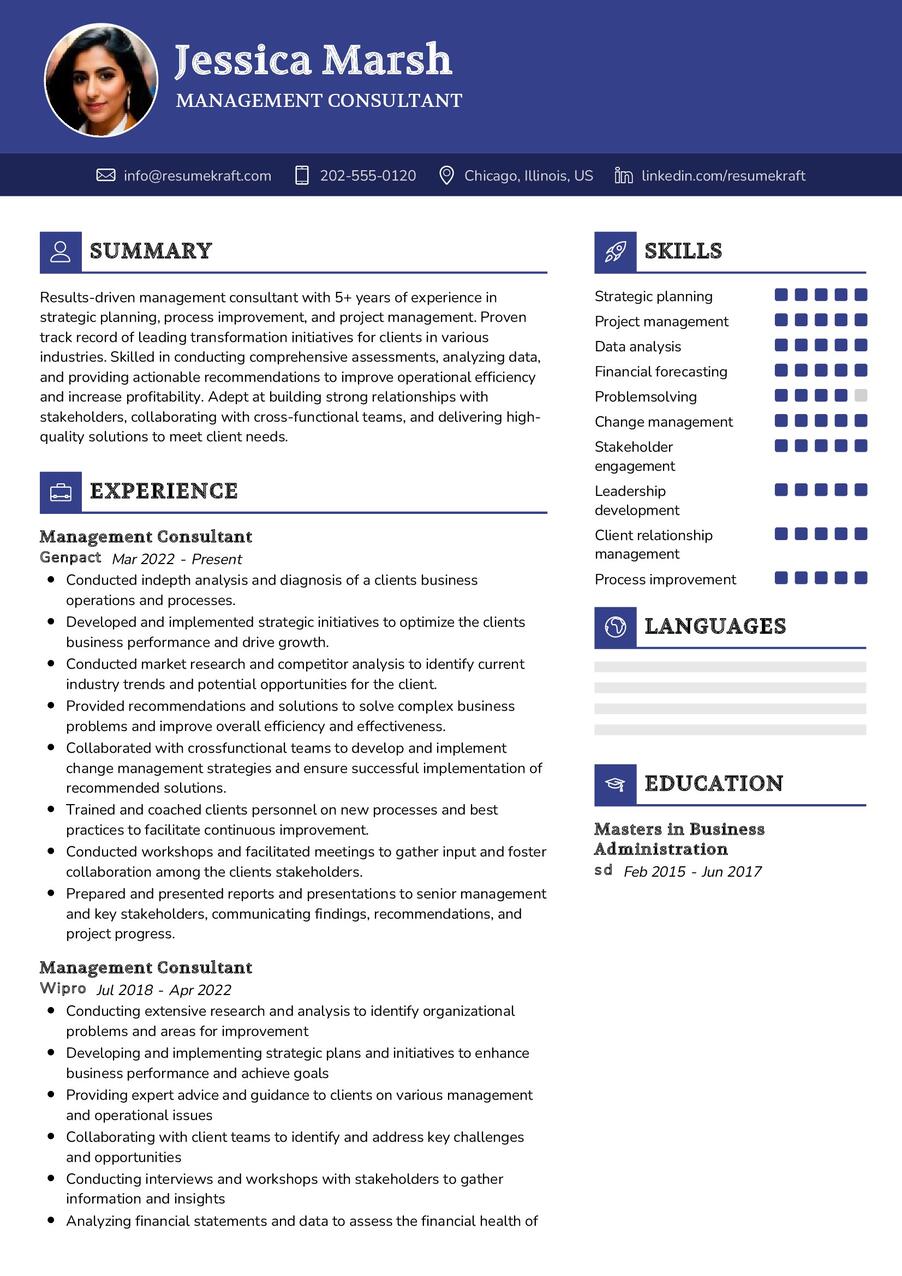Understanding the Role of a Management Consultant
In the ever-evolving landscape of business, the position of a Management Consultant has become increasingly crucial. This role requires a unique blend of analytical skills, strategic thinking, and effective communication. Let’s delve deeper into the multifaceted responsibilities of a Management Consultant, a position that demands not only a strong foundation in business principles but also the ability to drive positive change within organizations.
What are the Job Requirements for a Management Consultant?
Becoming a successful Management Consultant involves meeting specific requirements that shape your journey in this dynamic field. Here’s a detailed look at the prerequisites to embrace the role:
- A Bachelor’s or Master’s degree in Business Administration, Management, or a related field, showcasing a solid understanding of business principles.
- Proven experience in management consulting, demonstrating a track record of successful projects and client satisfaction.
- Analytical and problem-solving skills, honed through hands-on experiences and possibly through relevant certifications.
- Excellent communication and interpersonal skills, crucial for effectively liaising with clients and internal teams.
- Leadership qualities, developed through experiences in managing projects and leading teams towards successful outcomes.
- Proficiency in data analysis tools and techniques, a crucial aspect of making informed and strategic recommendations.
- Adaptability and resilience, essential traits to navigate the ever-changing business landscape.
Acquiring additional certifications in management consulting can further enhance your profile in this competitive field.
Responsibilities of a Management Consultant
The role of a Management Consultant is diverse, requiring a skill set that goes beyond traditional business practices. Let’s unravel the core responsibilities that define this role, each contributing to the overall success of the consultant and the organizations they serve:
- Conducting in-depth analysis of clients’ business processes and operations to identify areas for improvement.
- Developing and implementing strategic recommendations to enhance efficiency, reduce costs, and drive organizational growth.
- Collaborating with client teams to understand their goals, challenges, and opportunities for improvement.
- Providing expert advice on organizational restructuring, change management, and process optimization.
- Creating and delivering impactful presentations to communicate findings and recommendations to clients and stakeholders.
- Staying updated on industry trends and best practices to bring innovative solutions to clients.
- Building and maintaining strong client relationships through effective communication and delivery of value-added services.
Each responsibility contributes to the consultant’s role as a catalyst for positive change within organizations.
Crafting an Effective Management Consultant Resume
Your resume is a powerful tool to showcase your expertise and stand out in the competitive job market. Here are some tips to create a compelling Management Consultant resume:
- Highlight successful consulting projects, emphasizing the impact on clients’ businesses.
- Showcase your analytical skills by quantifying the results of your recommendations, using numbers and metrics.
- Include relevant certifications and training programs, demonstrating your commitment to professional development.
- Tailor your resume for each application, aligning your skills and experiences with the specific job requirements.
Each tip contributes to creating a resume that effectively communicates your value as a Management Consultant.
Management Consultant Resume Summary Examples
Your resume summary serves as a snapshot of your career, encapsulating your experiences, skills, and the value you bring to the table. Here are some examples to inspire you:
- “Results-driven Management Consultant with a proven track record in optimizing business processes and driving strategic initiatives for client success.”
- “Experienced Management Consultant specializing in change management, adept at guiding organizations through transformational journeys.”
- “Analytical and client-focused Management Consultant with a talent for identifying operational inefficiencies and implementing effective solutions.”
Each summary offers a glimpse into your career, strengths, and vision as a Management Consultant.
Building Your Management Consultant Experience Section
Your experience section is the heart of your resume, narrating the story of your career. Here are some examples to guide you:
- “Led a team of consultants in a project that resulted in a 15% increase in operational efficiency for a leading client in the manufacturing sector.”
- “Implemented a comprehensive change management strategy for a healthcare client, resulting in improved employee engagement and streamlined processes.”
- “Developed and delivered training programs for client teams, enhancing their understanding of new processes and ensuring successful implementation.”
Each experience is a chapter in your professional journey, showcasing your ability to drive positive outcomes for clients.
Education Section for Your Management Consultant Resume
Your educational background provides the foundation for your consulting expertise. Here’s how you can list your educational milestones:
- Master of Business Administration (MBA), XYZ University, a comprehensive program that equipped me with strategic management skills, 2015.
- Bachelor of Science in Management, ABC University, a solid foundation in business principles, 2012.
- Certified Management Consultant (CMC), demonstrating my commitment to professional excellence, 2018.
Each educational qualification is a stepping stone in your journey to becoming a successful Management Consultant.
Essential Skills for a Management Consultant Resume
Your skill set is your toolkit, showcasing the abilities that make you an effective Management Consultant. Let’s list down the crucial skills for success in this role:
Soft Skills:
- Analytical thinking and problem-solving, the ability to dissect complex issues and develop effective solutions.
- Effective communication and interpersonal skills, essential for building strong client relationships and collaborating with internal teams.
- Leadership and team management, the capability to guide and inspire teams towards achieving project goals.
- Change management expertise, the skill to navigate and lead organizations through periods of transformation.
- Adaptability and flexibility, crucial traits in an ever-changing business environment.
Hard Skills:
- Data analysis and interpretation, the proficiency to extract meaningful insights from complex datasets.
- Project management, the ability to plan, execute, and oversee consulting projects from inception to completion.
- Strategic planning, the skill to develop and implement effective strategies aligned with organizational goals.
- Industry knowledge, staying informed about current business trends and best practices.
- Client relationship management, the ability to understand and fulfill client needs effectively.
Each skill is a tool, contributing to your success as a Management Consultant.
Common Mistakes to Avoid When Writing a Management Consultant Resume
Steer clear of common pitfalls that can hinder your chances of landing your dream job as a Management Consultant. Here are some mistakes to avoid:
- Using generic language, a strategy that fails to highlight your unique strengths and experiences.
- Focusing on tasks rather than achievements, resulting in a resume that lacks impact.
- Ignoring the importance of a cover letter, a missed opportunity to showcase your passion for management consulting.
- Overloading your resume with technical jargon, potentially alienating non-specialist readers.
- Neglecting proofreading, a mistake that can undermine your professional image.
Avoid these mistakes to craft a resume that is both authentic and compelling.
Key Takeaways for Your Management Consultant Resume
As you conclude this comprehensive guide, remember these key points when crafting your Management Consultant resume:
- Highlight your successful consulting projects, emphasizing the positive impact on clients’ businesses.
- Showcase your analytical skills by quantifying the results of your recommendations using numbers and metrics.
- Personalize your resume for each application, aligning your skills and experiences with specific job requirements.
- Include a section on professional development, demonstrating your commitment to staying updated in the field.
Finally, feel free to utilize resources like AI Resume Builder, Resume Design, Resume Samples, Resume Examples, Resume Skills, Resume Help, Resume Synonyms, and Job Responsibilities to create a standout application and prepare for the Management Consultant job interview


